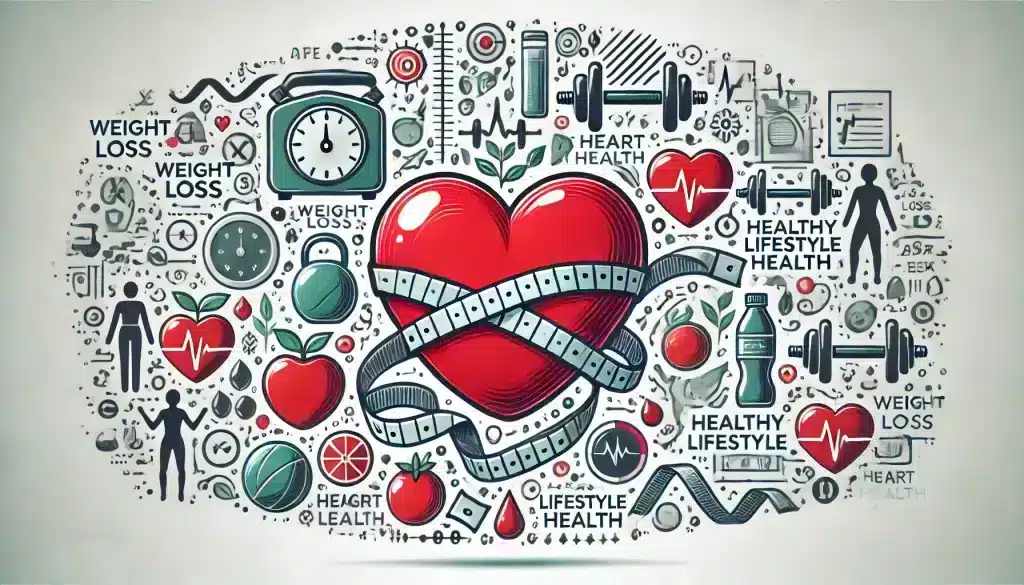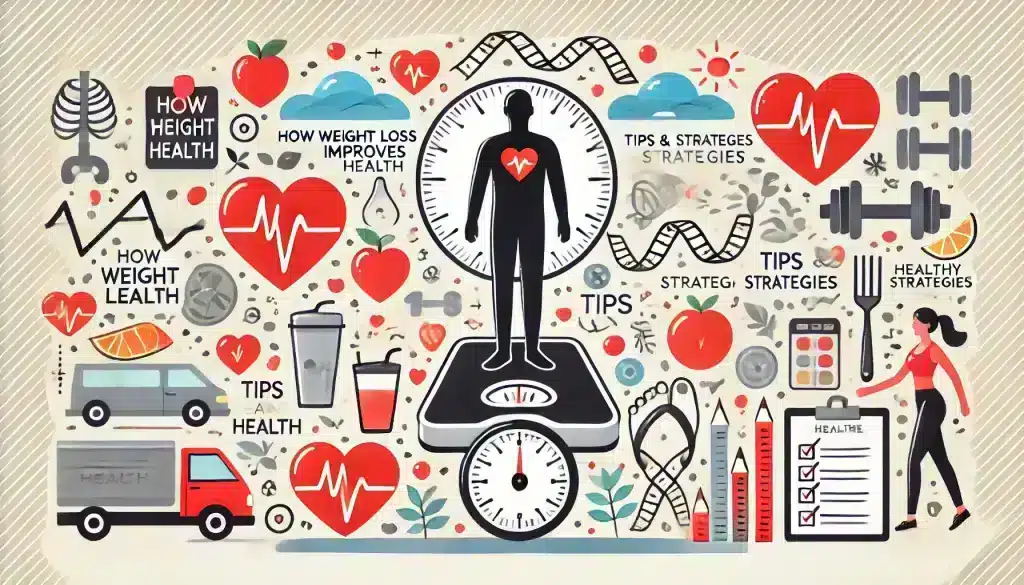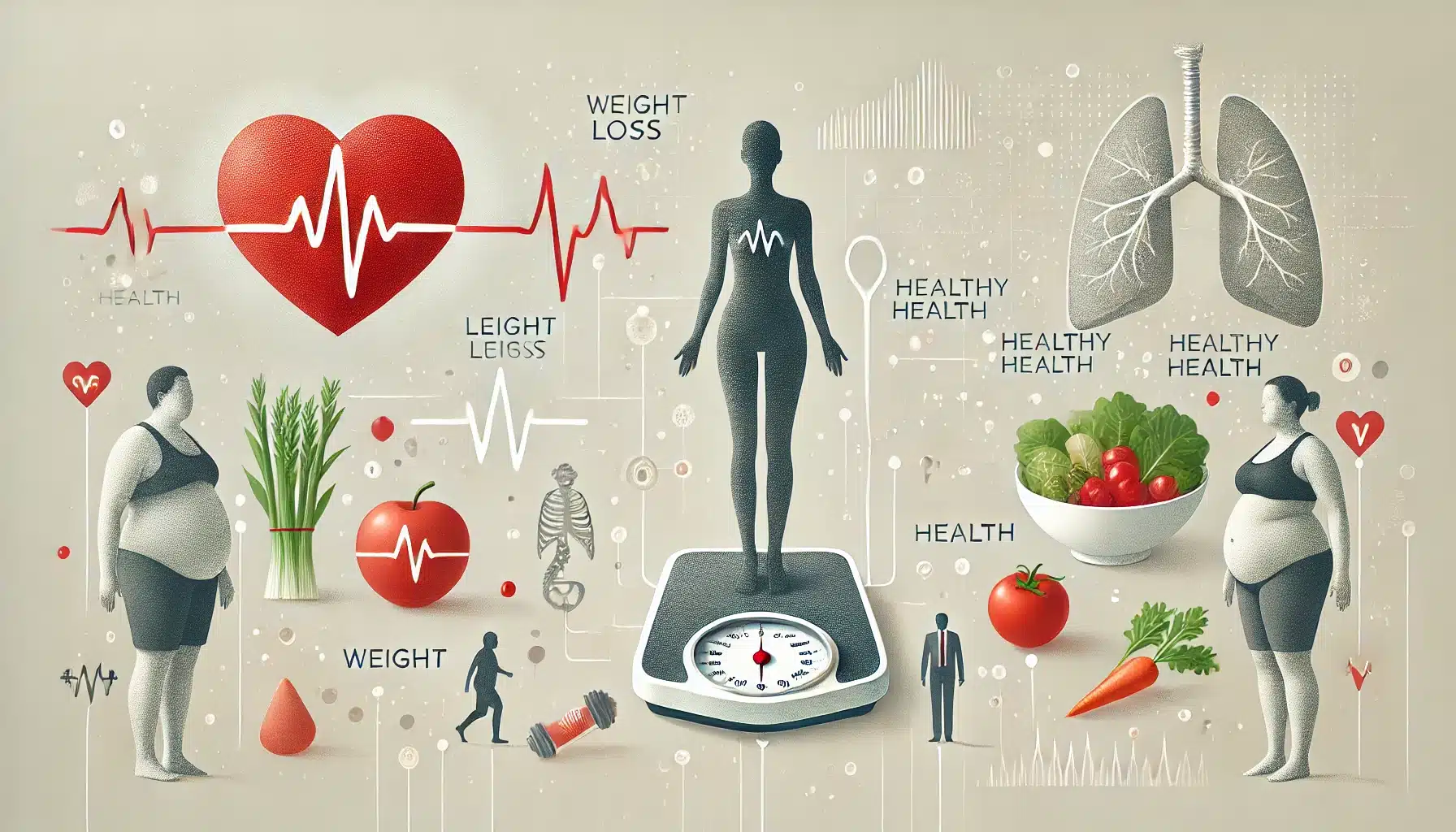The Connection Between Weight and Heart Health
The relationship between weight and heart health is well-established. Excess body weight, particularly in the form of fat, can put additional strain on your heart, leading to various cardiovascular issues. Understanding this connection can motivate you to make necessary lifestyle changes for a healthier heart.
How Excess Weight Affects the Heart
- Increased Blood Pressure: Excess weight can cause your body to retain sodium, leading to higher blood pressure levels. This increases the workload on your heart, making it pump harder to circulate blood.
- Higher Cholesterol Levels: Being overweight is often associated with higher levels of LDL (bad cholesterol) and lower levels of HDL (good cholesterol), which can lead to plaque buildup in the arteries.
- Elevated Blood Sugar: Excess weight, especially around the abdomen, can lead to insulin resistance, increasing the risk of type 2 diabetes—a major risk factor for heart disease.
- Inflammation: Obesity triggers inflammation throughout the body, including the arteries, which can contribute to atherosclerosis (hardening of the arteries).
By addressing excess weight, you can significantly reduce these risks and improve overall cardiovascular health.

Benefits of Weight Loss for Heart Health
Losing weight has numerous benefits for your heart health. Even a modest reduction in weight can have a profound impact on your cardiovascular system. Here are some of the key benefits:
Lowering Blood Pressure
- Reduced Workload on the Heart: By losing weight, you lower the amount of blood the heart needs to pump, which reduces the strain on your heart muscles.
- Improved Vascular Function: Weight loss helps improve the elasticity of your blood vessels, leading to better circulation and lower blood pressure.
- Decreased Risk of Hypertension: Reducing excess weight lowers the risk of developing high blood pressure, a major risk factor for heart disease.
Improving Cholesterol Levels
- Increased HDL (Good Cholesterol): Weight loss can increase levels of high-density lipoprotein (HDL), which helps remove bad cholesterol from your bloodstream.
- Decreased LDL (Bad Cholesterol): By losing weight, you can reduce low-density lipoprotein (LDL) levels, lowering the risk of plaque buildup in your arteries.
- Lower Triglycerides: Weight loss also helps to decrease triglyceride levels, further reducing the risk of cardiovascular disease.
Reducing Risk of Heart Disease
- Lowering Inflammation: Weight loss reduces inflammation markers in the body, which are linked to heart disease.
- Improved Heart Rhythm: Reducing weight helps in maintaining a normal heart rhythm, lowering the risk of atrial fibrillation and other heart-related issues.
- Enhanced Cardiac Function: Losing weight improves the overall function of the heart, making it easier for the heart to supply the body with the necessary blood and oxygen.
Achieving a healthier weight not only benefits your heart but also enhances your overall quality of life, providing more energy and reducing the risk of chronic diseases.
How Much Weight Loss is Beneficial?
Many people wonder how much weight they need to lose to see significant improvements in their heart health. The good news is that even a modest amount of weight loss can have a positive impact. Here’s what research suggests:
- 5-10% of Body Weight: Losing just 5-10% of your total body weight can result in significant health benefits, such as lower blood pressure, improved cholesterol levels, and reduced blood sugar levels.
- Incremental Benefits: As you continue to lose weight beyond the initial 5-10%, the benefits to your heart and overall health continue to grow, making each additional pound lost valuable.
- Focus on Sustainable Loss: Aim for a steady weight loss of 1-2 pounds per week. This rate is generally considered safe and sustainable, helping you maintain the weight loss in the long term.
- Waist Circumference Matters: For heart health, it’s not just about the number on the scale. Reducing waist circumference can also significantly reduce cardiovascular risks, especially when excess fat is stored around the abdomen.
Remember, the goal is not just to lose weight, but to maintain a healthy weight that supports your heart and overall well-being. Sustainable lifestyle changes are key to achieving and maintaining these health benefits.
Tips for Safe and Effective Weight Loss
Achieving safe and effective weight loss requires a balanced approach that incorporates healthy eating, regular physical activity, and sustainable lifestyle changes. Here are some practical tips to help you get started:

Setting Realistic Goals
- Start Small: Set achievable goals, such as losing 5-10% of your body weight initially. This not only makes the process less overwhelming but also helps in building momentum.
- Focus on Process Goals: Instead of fixating solely on the scale, set goals around behaviors, like exercising three times a week or eating vegetables with every meal.
- Be Patient: Sustainable weight loss takes time. Avoid extreme diets or rapid weight loss promises that can be harmful and difficult to maintain.
Healthy Eating Habits
- Eat Balanced Meals: Include a variety of fruits, vegetables, whole grains, lean proteins, and healthy fats in your diet to ensure you’re getting the nutrients your body needs.
- Watch Your Portions: Be mindful of portion sizes to avoid overeating. Using smaller plates and paying attention to hunger and fullness cues can help control portions.
- Limit Processed Foods: Reduce your intake of processed and high-sugar foods that contribute to weight gain. Opt for whole, unprocessed foods whenever possible.
Incorporating Regular Exercise
- Aim for Consistency: Regular physical activity is crucial for weight loss and heart health. Aim for at least 150 minutes of moderate-intensity exercise per week, such as brisk walking, cycling, or swimming.
- Mix Cardio and Strength Training: Combine cardiovascular exercises with strength training to maximize fat loss while building muscle, which helps boost your metabolism.
- Find Activities You Enjoy: Choose exercises that you enjoy to make staying active a sustainable part of your lifestyle. Whether it’s dancing, hiking, or playing a sport, enjoyment will keep you motivated.
By following these tips, you can work towards a healthier weight in a way that supports your heart health and overall well-being. The key is consistency, patience, and making changes that you can maintain over the long term.
Common Challenges in Weight Loss and How to Overcome Them
Weight loss is not always a straightforward journey, and many people encounter obstacles along the way. Recognizing common challenges and knowing how to address them can help you stay on track and achieve your goals.
Dealing with Plateaus
- What is a Plateau? A weight loss plateau occurs when your progress slows or stops, even though you are still following your diet and exercise plan.
- How to Overcome It: Try varying your workout routine by adding new exercises or increasing intensity. Adjusting your calorie intake or reviewing your portion sizes can also help you break through a plateau.
- Stay Patient: Plateaus are a normal part of the weight loss process. Focus on maintaining healthy habits, and the scale will eventually start moving again.
Emotional Eating
- Understanding Triggers: Emotional eating can be triggered by stress, boredom, sadness, or even happiness. Identifying your triggers is the first step in managing them.
- Healthy Coping Mechanisms: Instead of turning to food for comfort, try alternative coping strategies like going for a walk, practicing deep breathing exercises, or engaging in a hobby.
- Mindful Eating: Practice mindful eating by paying attention to your hunger and fullness cues, eating slowly, and savoring your food. This can help you distinguish between emotional and physical hunger.
Lack of Motivation
- Set Reminders of Your Goals: Keep your goals visible, such as by writing them down or setting reminders on your phone. Visual cues can help keep your motivation levels high.
- Find a Support System: Having a support system, whether it’s friends, family, or a weight loss group, can provide encouragement and accountability.
- Reward Yourself: Set small, non-food-related rewards for achieving milestones along your weight loss journey. This can keep you motivated and give you something to look forward to.
By understanding and preparing for these common challenges, you can develop strategies to overcome them and continue on your path to better heart health through weight loss. Remember, persistence and adaptability are key to long-term success.
FAQs About Weight Loss and Heart Health
1. How does weight loss benefit heart health?
Weight loss can significantly improve heart health by reducing risk factors such as high blood pressure, high cholesterol, and elevated blood sugar levels. Losing weight decreases the strain on your heart, helps improve blood vessel function, and lowers the risk of cardiovascular diseases.
2. What is the safest rate of weight loss for heart health?
A safe and sustainable rate of weight loss is about 1-2 pounds per week. This gradual approach reduces the risk of muscle loss, nutrient deficiencies, and other health issues, making it easier to maintain the weight loss long-term.
3. Can weight loss reverse heart disease?
While weight loss alone may not completely reverse heart disease, it can significantly reduce risk factors and improve overall cardiovascular health. Combined with other healthy lifestyle changes, such as a balanced diet and regular exercise, weight loss can help manage or even reverse some of the damage caused by heart disease.
4. Is exercise necessary for weight loss and heart health?
Exercise plays a crucial role in both weight loss and improving heart health. Regular physical activity helps burn calories, boosts metabolism, strengthens the heart, and improves circulation. Even moderate exercise, such as brisk walking, can make a big difference.
5. What should I eat to lose weight and improve my heart health?
Focus on a diet rich in fruits, vegetables, whole grains, lean proteins, and healthy fats. Limit processed foods, sugars, and saturated fats. A balanced diet not only supports weight loss but also provides essential nutrients that promote heart health.


